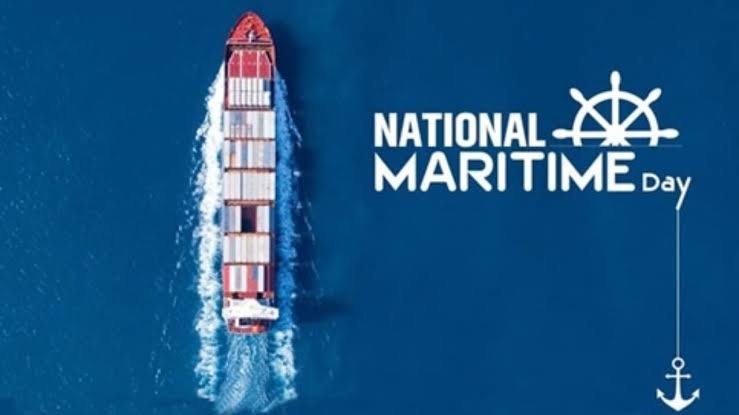
“Whoever controls the sea controls the trade; whoever controls the trade controls the riches of the world, and, consequently, the world itself.”-Alfred Thayer Mahan.
Every year on April 5th, India commemorates National Maritime Day, a day steeped in history and significance for the nation’s maritime industry. It’s a time to reflect on India’s rich maritime heritage and the pivotal role that the sea plays in its economic, cultural, and strategic landscape. This day holds special significance as it marks the maiden voyage of the first Indian-owned merchant vessel from Bombay to London. Back in 1919, on April 5th, the SS Loyalty, under the ownership of Sindhya Steam Navigation Company, embarked on its historic journey, symbolizing India’s entry into the world of maritime commerce.
The journey of the SS Loyalty wasn’t just a physical voyage from one port to another; it represented India’s aspirations for economic prowess and global connectivity. It laid the foundation for India’s emergence as a key player in the maritime domain, shaping its trade routes, fostering international relations, and fuelling economic growth.
Alfred Mahan, the renowned American naval theorist, once said, “Who rules the sea controls the world.” This statement resonates deeply with India’s maritime ambitions. Access to the sea has always been synonymous with power, and India, with its vast coastline and strategic location, understands the importance of harnessing its maritime resources. Woodrow Wilson’s concept of the freedom of the seas, articulated during World War I, emphasized the idea that all nations have the right to access the sea for trade and navigation. This notion laid the groundwork for modern maritime laws and regulations, ensuring that countries like India could benefit from the open seas.
With sovereignty over a marine area spanning 8,118 kilometres, India exercises paramount authority over its maritime domain. The presence of 118 minor ports and 12 major ports facilitates the movement of 1400 million tonnes of cargo annually, vital for the nation’s trade and economic growth. Additionally, the rich biodiversity of India’s coastal waters, comprising approximately 665 species of fish, supports the livelihoods of 40 lakh fishery workers engaged in allied activities. Seventeen crore people reside in coastal areas. Additionally, there are twenty lakh cubic meters of oil and natural gases present in our maritime borders.
As we celebrate National Maritime Day, it’s essential to recognize the contributions of seafarers, maritime professionals, and organizations dedicated to the advancement of India’s maritime sector. From shipping companies to port authorities, naval forces to maritime academies, countless individuals and institutions work tirelessly to ensure the smooth functioning of India’s maritime ecosystem. One prominent advocate of the blue economy is Gunter Pauli, whose “Blue Economy” concept proposes innovative solutions inspired by nature to address global challenges while promoting economic growth. Pauli’s ideas advocate for a shift towards a circular economy model, where waste is minimized, and resources are utilized efficiently, creating value while reducing environmental impact. His vision aligns with India’s goals of sustainable development and offers valuable insights for shaping the future of its maritime sector.
Moreover, National Maritime Day serves as a reminder of the need to prioritize maritime safety, security, and sustainability. With growing concerns about climate change, marine pollution, and maritime security threats, it’s imperative that India takes proactive measures to safeguard its marine resources and promote responsible maritime practices. In recent years, India has made significant strides in modernizing its ports, enhancing maritime infrastructure, and expanding its maritime capabilities. Initiatives like Sagarmala and Bharatmala have been instrumental in boosting coastal and inland connectivity, facilitating trade, and driving economic development. Looking ahead, National Maritime Day offers an opportunity to chart a course for India’s maritime future. By leveraging emerging technologies, fostering innovation, and strengthening international partnerships, India can further enhance its maritime competitiveness and establish itself as a global maritime leader.
In the realm of maritime law, the United Nations Convention on the Law of the Sea (UNCLOS) stands as a cornerstone. UNCLOS, adopted in 1982, provides a comprehensive legal framework governing maritime activities, including territorial waters, exclusive economic zones, and the rights and responsibilities of nations regarding marine resources and the environment. While India is not a signatory to UNCLOS, it abides by its principles and norms, recognizing the importance of adhering to international maritime law for peaceful coexistence and cooperation among nations. The United States, on the other hand, has signed UNCLOS but has not ratified it, citing concerns over certain provisions.
As we commemorate National Maritime Day, let us pay homage to India’s maritime legacy, celebrate its achievements, and reaffirm our commitment to harnessing the power of the seas for the prosperity and well-being of our nation. Happy National Maritime Day.
Leave a Reply